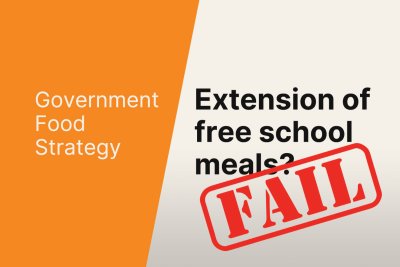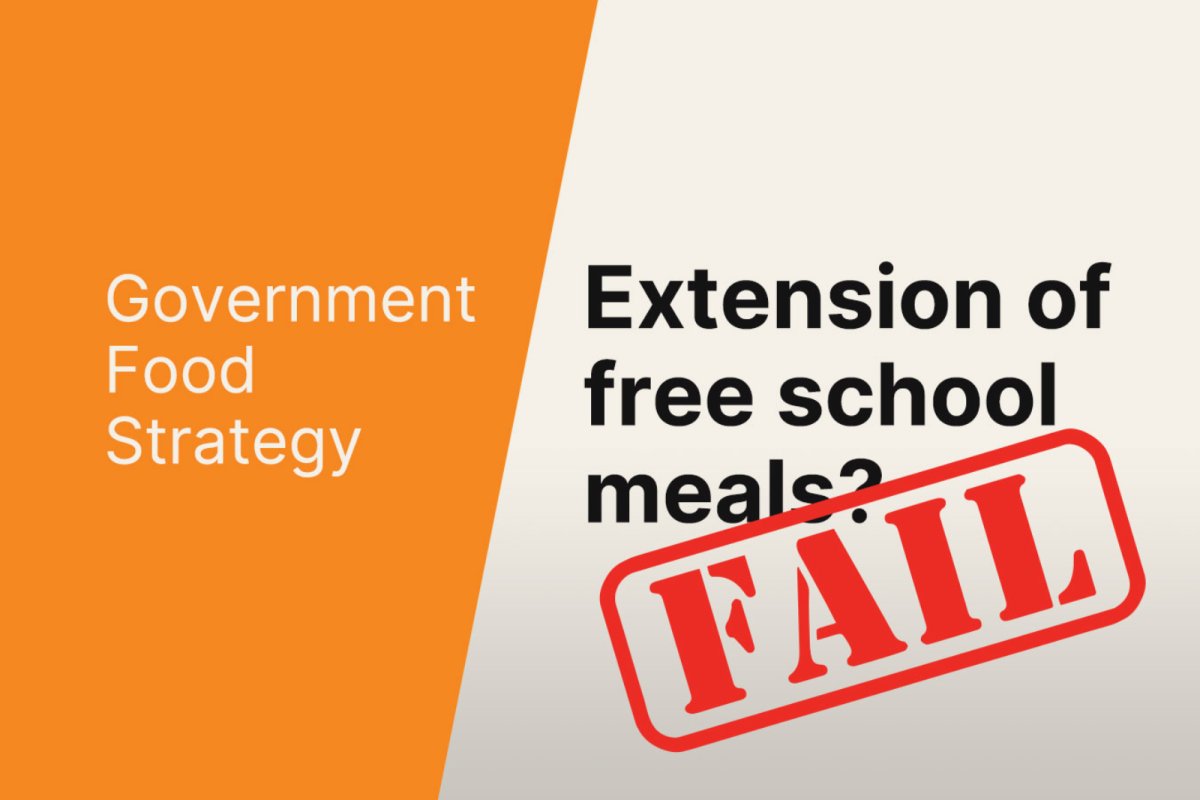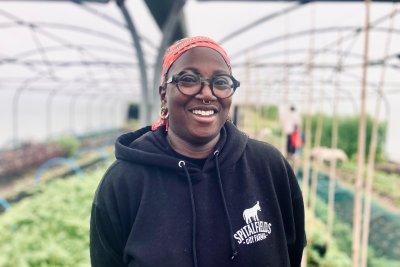

Government Food Strategy – Which NFS recommendations were passed, failed or are on their way?
After a 6 month delay, the Government has finally published its response to the National Food Strategy (NFS) which laid out 14 recommendations. But how many of them have been followed up? Sustain takes a look.
Launched in two parts over 2020-2021, the National Food Strategy was an independent review commissioned by government to set out a vision and a plan for a better food system. After two years of research and in-depth consultations across the food and farming sector, it laid out 14 recommendations.
How many of these recommendations have been followed up by Governemnt and included in their food strategy? Which ones have passed, failed, or are on the way?
National Food Strategy Recommendation 1:
Introduce a Sugar and Salt Reformulation Tax. Use some of the revenue to help get fresh fruit and vegetables to low-income families
Has it been delivered? ✖ No
However, the report acknowledges obesity levels, the junk food cycle and the role for government intervention.
It discusses “what Henry Dimbleby termed the Junk Food Cycle” (Para 2.1.3). It also acknowledges that the Sugar Reduction programme has seen ‘mixed progress by category, business and sector’ and talks about ‘the right incentives for change’. (Para 2.1.8)
On sugar and salt taxes and reformulation, it says “This includes a role for government in creating a level playing field through regulation. Some progress has been made. For example, in response to sharp rises in soft drink consumption, the government introduced the Soft Drinks Industry Levy. This fiscal incentive has been hugely successful, with industry reducing the total amount of sugar in the drinks within the Levy’s scope by around 44%.”
The strategy does not rule out future regulation: “There is a shared responsibility to identify the solution to obesity; industry has a role to play through its responsibility for promoting and supplying healthier foods, government has a role in making targeted regulatory interventions to support change.” (Para 2.1.9)
On Fruit and Veg, the paper commits to ‘review the current policy and delivery method of the School Fruit and Vegetable Scheme.’ (Para 2.2.4)
National Food Strategy Recommendation 2:
Introduce mandatory reporting for large food companies
Has it been delivered? ✔ Yes
The strategy commits to a consultation on mandatory reporting by industry on health, and hints at the same for sustainability and animal welfare in the future.
“By the end of 2023, in England, we will streamline for industry all reporting requirements relating to the production and sale of food and drink. We will consult on implementing mandatory public reporting against a set of health metrics and explore a similar approach to sustainability and animal welfare. These will initially be targeted at large companies across retail, manufacturing, out of home, food to go and online delivery businesses, and we will consult fully on changes prior to implementation.” (Para 2.3.4)
National Food Strategy Recommendation 3:
Launch a new “Eat and Learn” initiative for schools. [The Department for Education (DfE) should launch a new “Eat and Learn” initiative for all children 3–18 yrs, in partnership with the new Office of Health Promotion. This would make learning to eat well part of every child’s school experience. It would involve the following elements: 1. Curriculum changes 2. Accreditation 3. Inspection 4. Funding 5. Recruitment and training]
Has it been delivered? Partial
The strategy repeats commitments made in the Levelling Up White Paper, including asking schools to create and publish their whole school food vision their websites.
“We have recently announced up to £5 million to deliver a school cooking revolution with an ambition that children leaving secondary school know at least 6 healthy recipes.” (NB based on 21,990 state-funded schools in England, this works out at £227 per school). It also says “We will support teachers and school leadership, recognising their crucial role in teaching the value of healthy and sustainable diets, and we will consider insights from Ofsted’s forthcoming research review into design and technology to support the teaching of cooking and nutrition.” (Para 2.2.5 )
“The recent launch of the joint Department for Education (DfE) and Food Standards Agency (FSA) pilot for local authorities to assure and support compliance with the school food standards will help ensure progress is aligned with our ambition” (Para 2.2.4)
National Food Strategy Recommendation 4:
Extend eligibility for free school meals
Has it been delivered? ✖ No
The Strategy confirms existing commitments to extend FSM to some children with ‘No Recourse to Public Funds’, to retain Universal Infant Free School Meals and that it will keep eligibility under review
The Government “will continue to keep free school meal eligibility under review, to ensure that these meals are supporting those who most need them”. (Para 2.2.6)
National Food Strategy Recommendation 5:
Fund the Holiday Activities and Food programme for the next three years
Has it been delivered? ✔ Yes
This was previously announced in the Levelling Up White Paper, and provides £600m over the next three years. For Sustain it remains a concern that this programme does not cover the whole of school holidays, and access based on Free School Meal eligibility means many children are still missing out.
“We have already committed to continue funding the Holiday Activities and Food (HAF) Programme with a £600 million investment over a 3-year period.” (Para 2.2.6)
National Food Strategy Recommendation 6:
Expand the Healthy Start scheme
Has it been delivered? ✖ No
The Government increased the value of Healthy Start vouchers after Part One of the National Food Strategy, but haven’t implemented the recommendation to expand eligibility or promote more heavily. Sustain and our partners have flagged that the digitisation of Healthy Start has been problematic and many eligible families have been rejected.
“We have made it easier for families to apply for and use the Healthy Start Scheme through digitization.” (Para 2.2.6)
National Food Strategy Recommendation 7:
Trial a “Community Eatwell” programme, supporting those on low incomes to improve their diets
Has it been delivered? ✔ Yes
This was previously announced in the Levelling Up White Paper and is aimed at improving diets.
“We will undertake a programme of randomised control trials of interventions in the food system to encourage and enable healthier and more sustainable diets for all.” (Para 2.2.2)
National Food Strategy Recommendation 8:
Guarantee the budget for agricultural payments until at least 2029 to help farmers transition to more sustainable land use
Has it been delivered? ✖ No
Guaranteeing longer term payments for farmers to smooth the transition to sustainable land use has not been mentioned in this food strategy or in other legislation, policies or white papers. No new commitments on supporting farmers in the transition and in delivering public goods like nature and climate that has not already been announced.
National Food Strategy Recommendation 9:
Create a Rural Land Use Framework based on the three compartment model
Has it been delivered? ✔ Yes
The Land Use Framework has been broadly welcomed, but how it is implemented is key and there are concerns about the very short time frame to get it put in place. It should cover all land available including peri-urban as that could grow food and other public goods.
“In 2023, we will publish a land use framework that will reflect all our objectives for English Agriculture, the environment and net zero. It will also reflect and respond to the work of the House of Lords special inquiry committee into land use in England. This framework will inform incentives we build into our agri-environment schemes and should be a valuable resource for responsible authorities as they prepare their Local Nature Recovery Strategies.” (Para 1.2.3)
National Food Strategy Recommendation 10:
Define minimum standards for trade and a mechanism for protecting them
Has it been delivered? ✖ No
The chair of the Trade and Agriculture Commission has confirmed that setting core standards for imports can be done under international trade. It was recommended in by the first TAC, the National Food Strategy, the Committee on Climate Change.
“As we negotiate more FTAs, we will continue to use levers inside and outside trade negotiations to demonstrate the importance of these issues to the UK and promote better practices around the world.” (Para 3.4.3)
National Food Strategy Recommendation 11:
Invest £1 billion in innovation to create a better food system
Has it been delivered? ✖ No
The strategy repeats previous commitments and talks about a call for evidence on methane, a new What Works Centre and an Institute for Agriculture and Horticulture.
“To ensure the farming that underpins our resilient food production is sustainable, and maintains output, we plan to spend over £270 million across our farming innovation programmes to 2029 and have bolstered funding for farmers to invest in new equipment where there is scope to boost their productivity. This will also help farmers to identify and develop low carbon farming practices and carbon storage opportunities. Farmers and growers should be at the heart of innovation, with research driven by demand to boost production and profitability and reduce environmental harms. The Agriculture and Horticulture Development Board (AHDB) will play an important role in developing a What Works Centre to share best practice across the industry, which was recommended by Henry Dimbleby to improve the quality of advice on the practical implications for agriculture of goals such as net zero. This will be complemented by the new Institute for Agriculture and Horticulture (TIAH), due to launch in 2023, which will help farmers and growers to access the right skills to run professional, sustainable, and profitable businesses” (Para 1.2.4)
National Food Strategy Recommendation 12:
Create a National Food System Data programme. The Government should create a National Food System Data Programme to collect and share data, so that the businesses and other organisations involved in the food system can track progress and plan ahead
Has it been delivered? Partial
There is a commitment to a data partnership with industry but the original recommendation was that this be led by Government
To drive positive change through better information, transparency, and accountability, we are launching a transformational Food Data Transparency Partnership. The partnership will champion consumer interests, providing people with the information they need to make more sustainable, ethical, and healthier food choices, and incentivise industry to produce healthier and more ethical and sustainable food. (2.3.2. )
“The partnership will provide a framework with the ambition to bring together government departments and agencies in England and the DAs, including DHSC, the FSA and Food Standards Scotland (FSS), with representatives from across the whole food supply chain and civil society, to at first look at the development of consistent and defined metrics to objectively measure the health, environmental sustainability, and animal welfare impacts of food. (Para 2.3.3.)
National Food Strategy Recommendation 13:
Strengthen Government procurement rules to ensure that taxpayer money is spent on healthy and sustainable food
Has it been delivered? Partial
Consulting on extending the Government Buying Standards to more of the public sector and an ‘aspiration’ to include more local and sustainably produced food will be welcome, but many public sector contracts don’t meet the standards they’re already supposed to so we would like to see them enforced.
“We are consulting on public sector food and catering policy, including the Government Buying Standards for Food and Catering Services (GBSF). We will consider widening the scope of the policy to be mandatory across the whole public sector. Within the consultation we will propose that the public sector reports on progress towards an aspiration that 50% of its food expenditure is on food produced locally or to higher environmental production standards such as organic, Linking Environment and Farming (LEAF) Marque or equivalent, while maintaining value for money for taxpayers.” (Para 2.4.2)
National Food Strategy Recommendation 14:
Set clear targets and bring in legislation for long-term change
Has it been delivered? ✖ No
There is no Food Bill in this Strategy, however, it does leave the door open to future legislation.
“Our assessment is that we have existing powers in primary legislation to implement the measures in this strategy. However, we will seek primary or secondary legislation as required to achieve our objectives.” (pg 9)
National Food Strategy: Launched in two parts over 2020-2021, the National Food Strategy is an independent review commissioned by government to set out a vision and a plan for a better food system.
Sustain
The Green House
244-254 Cambridge Heath Road
London E2 9DA
020 3559 6777
sustain@sustainweb.org
Sustain advocates food and agriculture policies and practices that enhance the health and welfare of people and animals, improve the working and living environment, promote equity and enrich society and culture.
© Sustain 2025
Registered charity (no. 1018643)
Data privacy & cookies
Icons by Icons8







